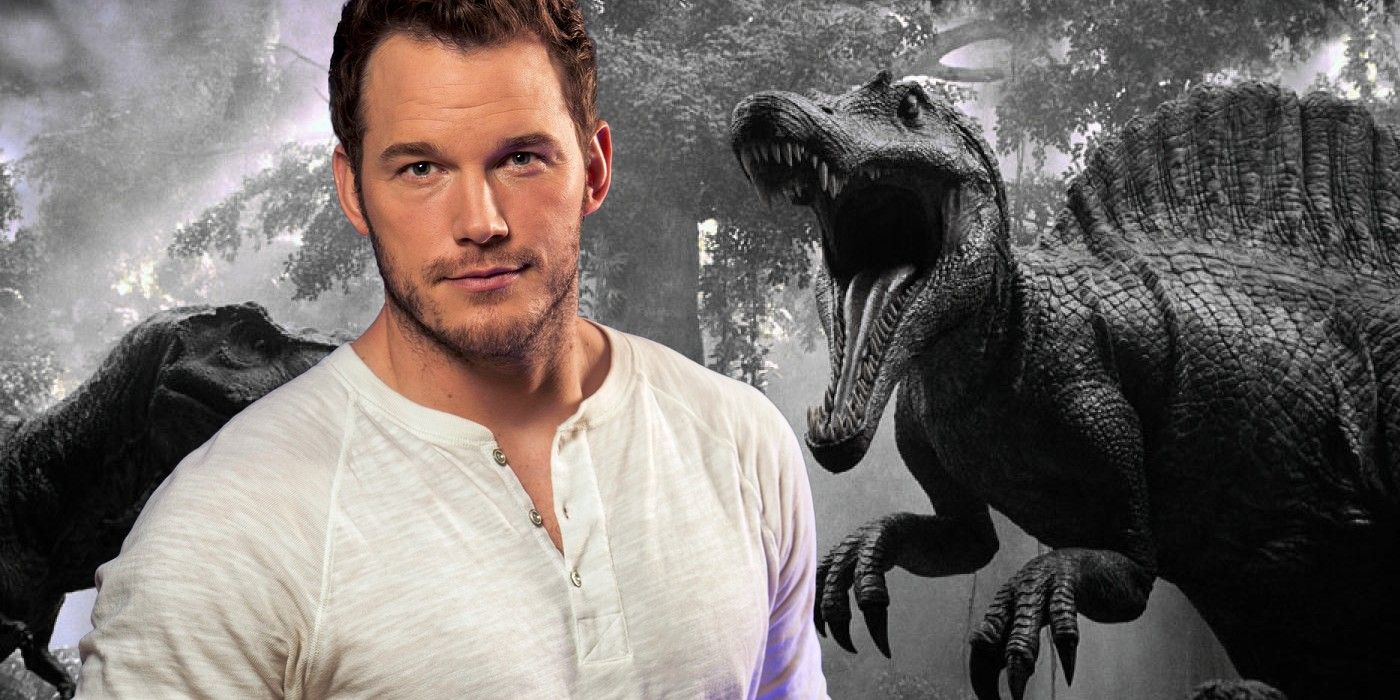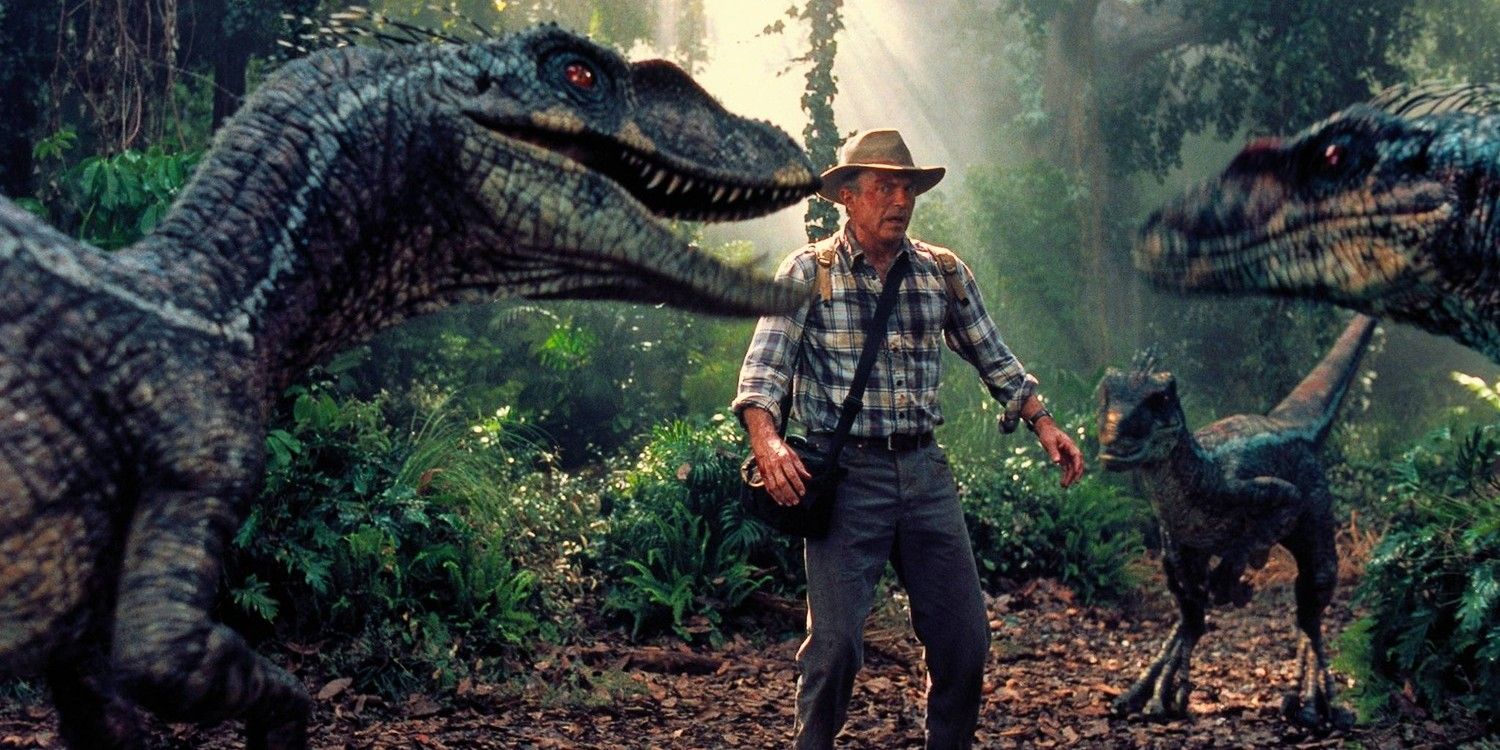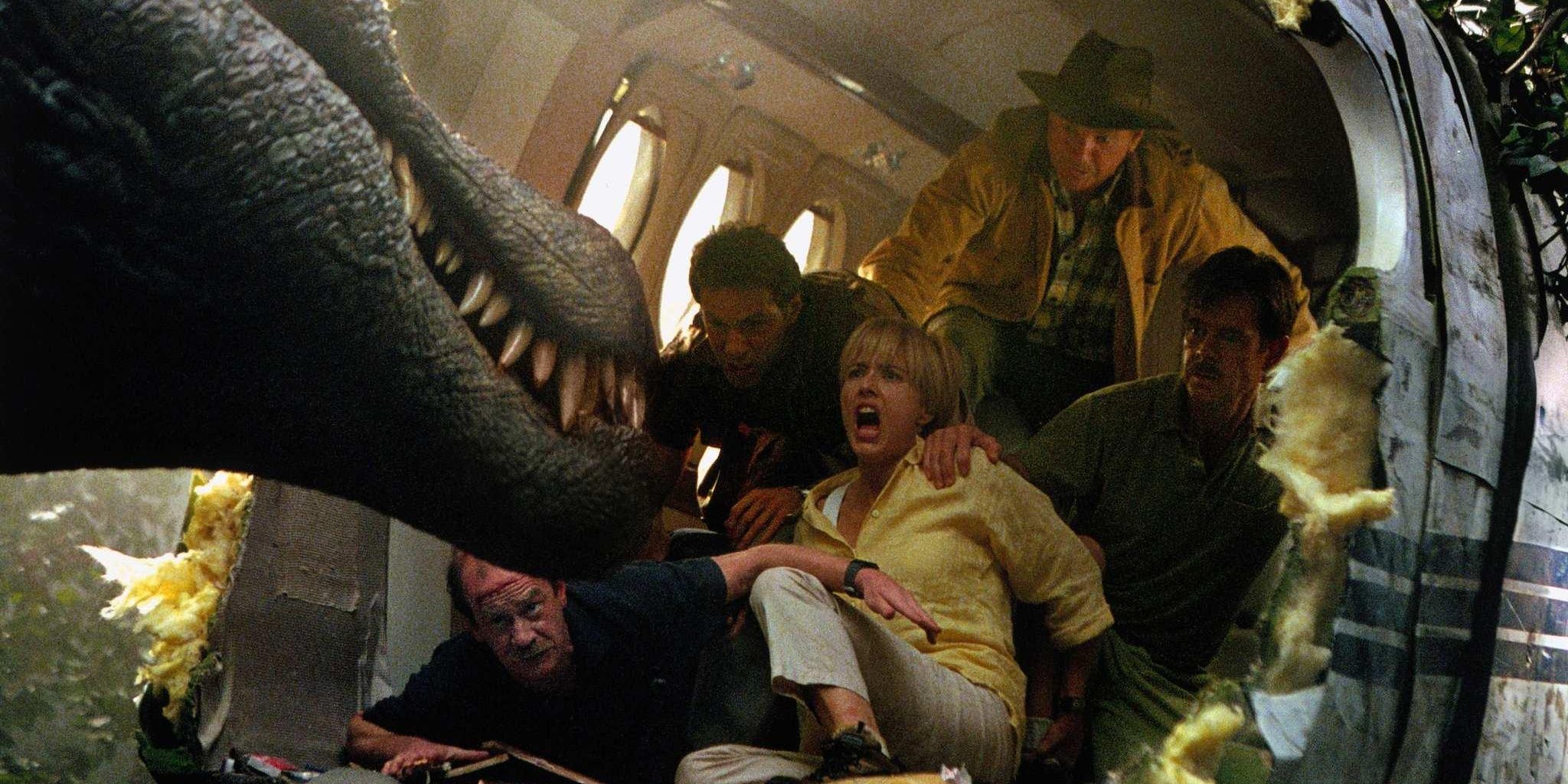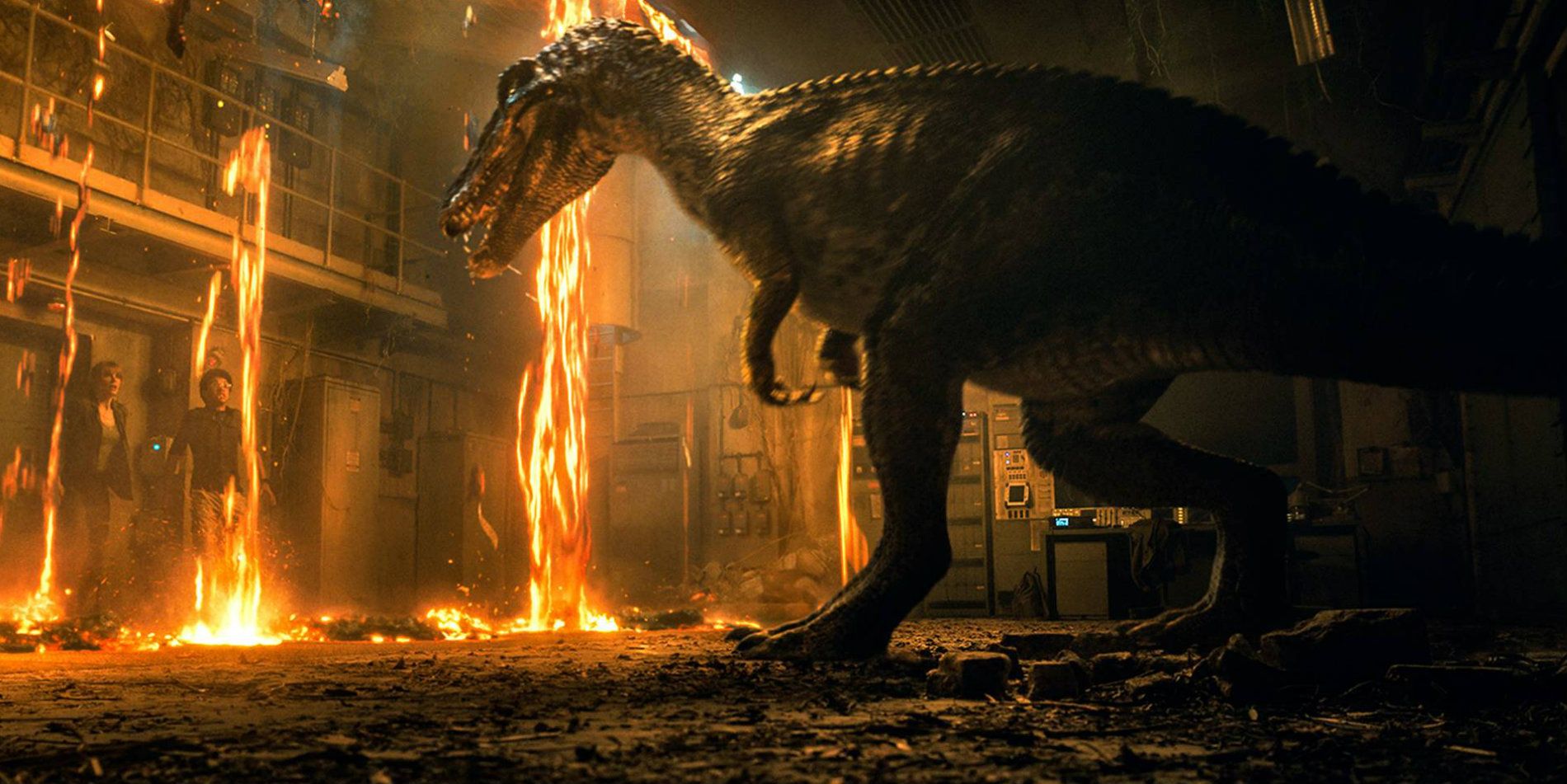
The upcoming Jurassic World 3 (aka. Dominion) can give the Jurassic Park sequel trilogy a good ending, but it needs to avoid the mistakes of Jurassic Park III. When Steven Spielberg adapted Michael Crichton's best-selling novel Jurassic Park in the early 1990s, he had no idea (okay, maybe some idea) of what a game-changer it would become, not only with regard to its then-revolutionary use of CGI, but also in terms of its popularity. Nearly thirty years later and the movie remains a thrilling tale of genetic manipulation gone wrong and human arrogance in the face of the natural world. (The actual dinosaurs still look pretty great too, even after all the advancements in VFX since it was made.)
Jurassic Park was such a big hit (becoming the highest-grossing film ever at the time of its release in 1993) it has gone to spawn multiple followups, including an entire sequel trilogy that began with Jurassic World in 2015 and will wrap up with 2021's Dominion. For the most part, though, everyone agrees the franchise has never come anywhere near to matching the creative accomplishment of the first movie and grown increasingly reliant upon nostalgia for Spielberg's original dino-adventure to keep audiences coming back agin and again, the more time passes.
Despite this, there's renewed excitement for Dominion thanks to the intriguing cliffhanger ending to the second Jurassic World film, Fallen Kingdom. Helping the situation, the trilogy's co-writer and Jurassic World director Colin Trevorrow is back at the helm for Dominion at a time when his stock, so to speak, is up following the release of his well-received Battle at Big Rock (an 8-minute short set between Fallen Kingdom and Dominion) and positive reactions to the leaking of his unmade Star Wars 9 screenplay. Still, if Dominion is to have any hope of sticking the landing, it should learn a lesson from the mistakes of the Jurassic Park trilogy's finale.

One of the biggest issues with the Jurassic Park trilogy, as a whole, can be attributed to the fact that Jurassic Park wasn't intended to be a franchise. Crichton only wrote his sequel novel, The Lost World, in response to the popularity of his original book and Spielberg's movie, and even then the film version (which Spielberg also directed) only adapted the broader strokes of Crichton's source material. Because of this, there wasn't a sturdy narrative foundation in place for The Lost World: Jurassic Park and Jurassic Park III to expand into a trilogy arc. The Lost World movie, in its defense, does attempt to build upon its predecessor by telling a story about animal rights, human greed, and capitalism's exploitation of nature, but understandably has a difficult time continuing a tale that wasn't supposed to keep going. By the time Jurassic Park III (which Spielberg passed on directing) came out, the series had more or less abandoned any notion of having an overarching structure and didn't come to a full-blown conclusion so much as it merely stopped.
Of course, people loved the original Jurassic Park (and were still happy enough simply to see dinosaurs back on the big screen) so much this wasn't really a problem, and both The Lost World and Jurassic Park III made a bundle at the box office despite earning, at best, middling reviews. It's a different situation with the sequel trilogy: the first Jurassic World movie and Fallen Kingdom earned a mixed reception combined, so there's greater pressure on Dominion to hit a home-run and end things on a high note. There might be other Jurassic films in the earliest stages of planning, but that's all the more reason why Jurassic World 3 needs to bring the trilogy's story to a satisfying close first.

This brings us back to Jurassic Park III, a movie that had loads of problems both before and after the cameras started rolling. After being disappointed with how The Lost World turned out (and not eager to put himself through the arduous experience of making another Jurassic Park sequel), Spielberg passed the job of directing the third entry over to Joe Johnston. The Honey, I Shrunk the Kids and Jumanji helmer had been interested in making a Jurassic Park sequel ever since the original film came out, but cracking the story and script proved harder than expected. In the end, Jurassic Park III began shooting in the summer of 2000 without a finished screenplay, despite having undergone multiple rewrites over the prior three years. As a result, Johnston and his cast/crew had to craft the script's second act and ending while they were filming them - something that made production all the more challenging than it would've been otherwise.
Knowing this, it's easier to understand why Jurassic Park III turned out the way it did. The film's new characters are thinly-sketched and its plot is equally barebones, which makes sense when one remembers they were actively being scripted as the movie was made. Also gone is any real sense of wonder at the sight of dinosaurs walking the earth again from the first film: the third installment is essentially a big-budget monster B-movie where humans spend most of the runtime literally running around trying to stay alive. To be fair, a number of people like how stripped-down the film is compared to other Jurassic sequels, and Johnston does manage to deliver a handful of genuinely harrowing action sequences. Still, for a franchise that started out as a fascinating and thoughtful cautionary tale about the power of creation and evolution, it was disappointing to see Jurassic Park reduced to a bunch of campy scares and hammy one-liners.

When push comes to shove, Jurassic Park III certainly has its entertainment value (it's a lean, mean thrill ride geared towards delivering as many dinosaur-based action scenes as possible in 92 minutes), but it doesn't add anything of narrative substance or provide a sense of closure to the first two movies, as a decent trilogy finale should. Any questions moviegoers were left with after Jurassic Park and The Lost World were given pat answers or outright ignored and the Jurassic World films have basically overlooked Jurassic Park III's existence - even more than they've danced around acknowledging what transpired during The Lost World - as a result. The absence of a larger game plan hurt the Jurassic Park trilogy in the long run, and it's one aspect the Jurassic World series (which Trevorrow pitched as a three-part narrative from the beginning) can readily improve upon.
Fortunately, all Dominion really needs to do to have a satisfying ending (and avoid dropping the ball) is to pay-off the plot threads intentionally left dangling at the end of Fallen Kingdom. The biggest question it needs to address is whether dinosaur-kind can be left to live freely or must be destroyed, now that the ones who survived the destruction of Isla Nublar have been set loose in the world. This is also where Dominion can at last make good on both the trilogy's title and Battle at Big Rock's tease of what life is like for people when dinos can suddenly pop up out of nowhere and wreak havoc. Finally, there's the question of the young human clone Maisie Lockwood (who Trevorrow has confirmed will return via a set photo) and what role she has to play in all of this. So long as Dominion focuses on finding interesting ways to tie these loose threads up and avoid getting lost in nostalgia (something that could be tricky, what with the stars of the original Jurassic Park all returning in the movie), it shouldn't have a hard time succeeding where Jurassic Park III did not.
from ScreenRant - Feed https://ift.tt/393YSom


0 Comments